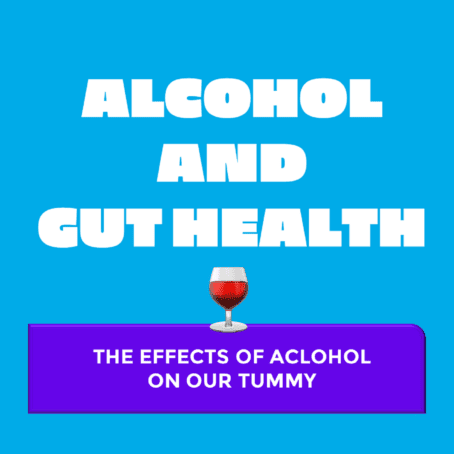We’re the first to admit we enjoy a Friday night tipple. Which means we’re well aware of the immediate after-effects of a big night. And the longer-term troubles that can arise with excessive alcohol consumption. That’s why we’ve pulled together some of what we know about alcohol and gut health. So you can enjoy a drink, while looking out for your tummy too.
We’ll be taking you through both the short and long-term effects of alcohol on the gut. The ins and outs of a hangover (and how to manage one). While also running through the science behind our drinks of choice.
What are the short- and long-term effects of alcohol on our tummy?
Alcohol can have various effects on our tummy – from top to bottom (literally). Here’s a brief overview of how alcohol affects different parts of the GI tract:
1. Mouth and Throat
Alcohol doesn’t damage teeth directly (otherwise putting it in mouthwash would be silly). But alcoholic fizzy drinks that are very acidic can erode enamel! Also, excessive alcohol consumption, especially in combination with smoking, is strongly linked to oral and throat cancer.
2. Food pipe (Oesophagus)
Alcohol relaxes the the muscular ring at the bottom of your food pipe (oesophagus). We call this ring of muscle the lower oesophageal sphincter. It acts as a valve to let grub into your tummy, but then closes again to stop it from coming back up. When alcohol causes this valve to relax, food and acid can come back into the food pipe. We call this phenomena “reflux”. Excessive reflux caused by alcohol can lead to a whole lot of other conditions, such as inflammation and in turn difficulty swallowing.
3. Stomach
Did you know alcohol is one of the very few substances that can be directly absorbed through your stomach? But, this also means alcohol can irritate the stomach lining, leading to inflammation and with excess consumption and stomach ulcers. Alcohol can also affect how quickly (or slowly) your tummy empties food. A stiff drink like whisky appears to slow down your stomach whereas drinks with lower alcohol concentrations, like beer and wine, appear to speed it up.
4. Small Bowel
Alcohol can interfere with the absorption of essential nutrients in the small intestine. Excess alcohol may damage cells that are needed to absorb nutrients. Therefore, excess alcohol consumption could potentially lead to nutritional deficiencies.
5. Large Bowel
Alcohol can cause both diarrhoea and constipation. Firstly, alcohol can disrupt the balance of beneficial bacteria in your large intestine, which can affect digestion and bowel movements. Secondly, the large bowel is responsible for reabsorbing water. But alcohol can cause the colon to contract more, so less water is absorbed leading to diarrhoea. Also, since alcohol is a diuretic (causing you to pee out water), your large bowel may draw more water from your poo, leading to constipation.
It’s important to note that the effects of alcohol on your tummy can vary depending on many factors. These include the amount and frequency of alcohol you consume, your individual sensitivity, your size, your genetics and your overall health. In the UK, normal alcohol consumption is generally considered no more than 14 units per week, and this applies to both men and women.
The dreaded hangover
Ever had a few too many drinks at a wedding or celebrating your birthday? Then you’ve probably experienced the dreaded hangover that comes with it too. Apart from the headache and regret, here are the tummy troubles caused by an all-day drinking session, and how you can help prevent them!
1. Nausea and vomiting
Arguably the worst symptom of a hangover. The irritation from alcohol on your stomach lining can cause nausea and vomiting. But, persistent vomiting after alcohol ingestion can be a sign of alcohol poisoning and you should seek medical help for this.
TIP: Regularly consume food alongside your drinks to reduce the amount of alcohol being absorbed directly by your gut.
2. Heartburn and indigestion
Heartburn and indigestion are the sensation of fire in your chest and stomach. They can be caused by alcohol (or eating kebabs at 2am) as alcohol stimulates excess acid production.
TIP: taking an antacid medication before drinking alcohol can help to reduce the amount of stomach acid produced.
3. Dehydration
Alcohol makes you pee out water. This can lead to dehydration, especially in combination with the vomiting or diarrhoea.
TIP: drink a glass of water for every alcoholic drink you have and replenish electrolytes the next day.
And perhaps worst of all, there’s always that one friend who doesn’t get hangovers. Want to know why? Keep reading to find out.
First though, we must emphasise that excessive alcohol is NOT good for your gut or overall health. But does that mean drinking alcohol doesn’t have any health benefits? Read on to find out…




